The man who had a front row seat to the Asbury Outpouring talks humility, the kindness of God and how the death of his daughter reshaped his relationship with Jesus
Zach Meerkreebs had that sinking feeling most preachers can identify with. You’ve prayed, planned and prepared but, for whatever reason, the message you’ve delivered just hasn’t connected the way you hoped it would.
Tired and disappointed, Zach sat down after speaking on Romans 12 inside the chapel of a small Christian university in Kentucky. He texted his wife the words: “I don’t think it went very well.”
He was wrong.
Zach’s message marked the beginning of what became known as the 2023 Asbury Revival. After his sermon, 20 students stuck around to carry on praying – and they never left. Instead, hundreds, and then thousands, joined them. Spontaneous prayer and worship took place round the clock for the next two weeks and more than 50,000 people from across the globe descended on Asbury University, with many reporting miraculous encounters with the presence of God.
Millions watched on via YouTube, celebrating what The New York Times called: “the first major spiritual revival in decades”, thanks to a potent mixture of tech-savvy Gen Zers, smartphone cameras and TikTok.
“It was very unique,” remembers Meerkreebs. “It wasn’t loud and wild. It wasn’t immediate signs and wonders. It was really the kindness and gentleness and humility of Jesus manifested. It was like the fruits of the Spirit had manifested in the room, and it was gorgeous and captivating.”
I believe God would have inconvenienced a town and brought thousands there, just for one person to come to Christ
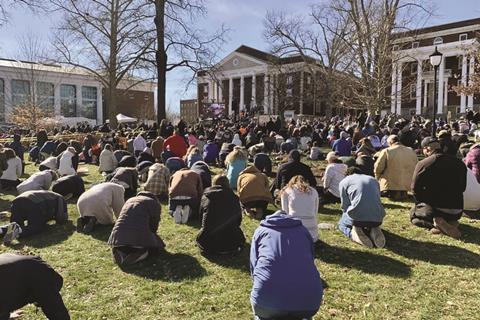
It’s hard not to speculate that Asbury kickstarted something of a renewal among students and Gen Z. In the 16 months since, survey after survey has hinted at increasing interest in God, church and faith from younger people – on both sides of the Atlantic. I was curious to find out what Zach thought about this idea. And what other lessons the Church might learn from this most unexpected of outpourings.
To what extent did your sermon result in the outpouring at Asbury?
I have absolutely no clue. Was it nothing and God just decided, in his kindness and sovereignty, to do it? I don’t know. Was it because I had been travailing in prayer and fasting for revival in the next generation? Definitely not, sad to say, because I hadn’t.
Was it me? He does use people, and sometimes he uses people because of the significance of the person – we see that through scripture. But I really don’t know.
Some people think Asbury happened because I, as a Jewish man, was preaching. I don’t know about that. I think God can do whatever he wants with whoever he wants.
Some people have been encouraging me to give up that [way of thinking] and realise that God did choose me, and I need to stop dilly-dallying and apologising. And there’s probably some who are like: “Woah! how dare you? This has nothing to do with you!” And I don’t know if I would disagree with them either.
During past revivals, people have sometimes elevated one individual leader, but the reports from Asbury suggested that it was student-led and no individual was being put on a platform. Was that really the case?
Yeah, it really was. We used phrases such as: “Jesus is the only celebrity in the room.” We used words like: “nameless, faceless”. And I remember when, all of a sudden, my name was being connected to some of these things because my sermon had got views on YouTube. I said to the team: “Do I need to remove myself because it is antithetical to what we’re trying to pioneer?”
It wasn’t a [criticism of] people that are Christian celebrities. But there was an intentionality to create a lane for young adults to lead. We would play defence for them, we would be shade to them, we would guide them.
God treats ego and the posture of our hearts quite seriously
This has been a consistent wrestling for me and others who have been catalysed out of Asbury – how do we now, to the best of our ability, stay in that posture [of humility]? Two years ago, I wasn’t in Premier Christianity, and that’s just a reality, but can we keep a level of consecration and a pursuit of humility that matches those 16 days? I have to believe that we can.
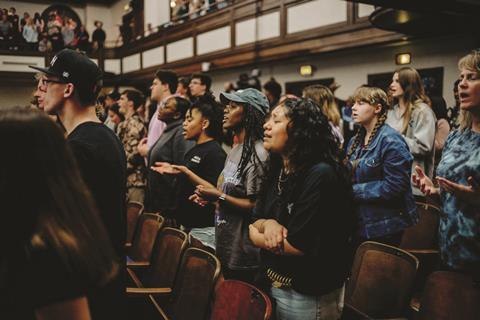
Is it true that well-known worship leaders offered to come and contribute at Asbury, and you turned them down, saying the students had it under control?
Our heart wasn’t to deny anyone. It was more just, seemingly, God was using a certain population [the students] during that time. There were times when very gifted, well-known people did serve, but it was just not the priority.
What’s beautiful is a lot of those people that we would deem ‘Christian celebrities’ are beautifully humble and consecrated; 99.9 per cent of the time the people who came exuded humility and just wanted to be in his presence.
After 16 days, the meetings were closed down. Whose decision was that?
Closing public services was a tremendously difficult decision to make. It was shared. It was stewarded by Asbury seminary leaders.
You say it was ‘difficult’. Does that mean there were people on your team on both sides, debating whether to stay open or not?
Yeah, you know, there were really practical elements, like the city was overrun. It’s a 6,000-person town with two stop lights. People’s yards were getting parked in because we ran out of parking lots.
It’s a university, not an event venue. You still have to get those students into classes. So, we prayed and fasted, we talked through lots of options. It was a group decision, but we really deferred to our hosts, Asbury University. And they were heroic, bold and courageous to make the hard decision.
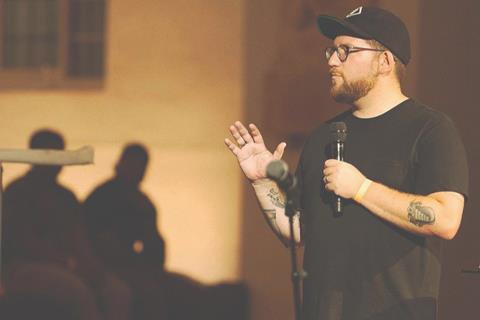
We were really praying that this would not be a closure, but a catalyst and, through partnership and opportunity since, I do believe it acted as a catalytic event.
Some critics have questioned if there is lasting fruit from Asbury. Was it just a wonderful few weeks of worship, or did it actually have an effect outside the four walls of that chapel? If this was a genuine revival, shouldn’t we expect to see a massive upturn in numbers of people flocking to local churches all around Asbury?
I’m not a revival historian, so there are better people to ask about that. But we have very purposefully tried not to call this a revival. It sounds cheesy to even try to name something, but we had the conversation of: “Hey, if people start asking us, what are we calling this?” We called it an outpouring. It felt like a unique outpouring of God’s presence.
We know the Lord would have sent his Son to die for just one person. So, I believe he would have inconvenienced a town and brought 80,000 people to that town, just for one person to come to Christ. So, you don’t have to call it something – you could just call it Wednesday Chapel, and if it led one person to Christ, then I think as Christian believers, we should all be a little bit more excited about that.
If the power and presence of God is falling, I would like to be a place where it puddles up
I do see, from my perspective, an uptick of curiosity in Gen Z. We do have churches in the area that have exploded in size and the presence of God. We have seen more people come to Christ. We’re seeing university students flocking to respond to the gospel in the United States. I believe Asbury gave vision, faith and hope to lots of people to go for it.
We’ve been reporting on research that speaks of a ‘quiet revival’ taking place, especially among Gen Z. Was Asbury the beginning of this move of God?
I don’t know if I would say beginning. If you just look at the numbers, it didn’t start on 8 February 2023 – it started a long time ago.
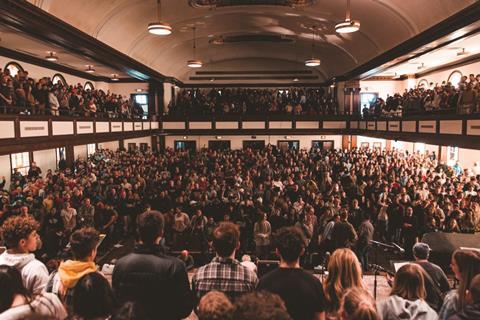
But it was called “Gen Z’s first revival”. And perhaps the first time we saw a revival happening in real time on social media?
Yeah, The New York Times called it this generation’s “awakening”. So, I do think there are accelerators.
I think it was a moment that sparked curiosity and maybe accelerated some of the things God is doing around the world. I would not be so bold to call it the beginning. But do I think it accelerated and envisioned? Totally. Do I think there’s an uptick in a move of God? When I look at the reports, it does seem like it, and I am encouraged.
How did you become a Christian?
I grew up in a Jewish home and I didn’t hear a whole lot about Jesus. My mum and dad got divorced, then I was bar mitzvahed when I was 13. I felt like my rabbi had given me some encouragement, or even promises, that something was going to shift at that moment, and nothing did. So, I was really disappointed, and I turned towards the world – girls, drugs and drinking.
On my soccer team, there were these unbelievable guys, and the common denominator between them was that I noticed their families would always pray to Jesus before dinner. Their Christian witness was not preaching, but just dads being good dads and husbands being good husbands – that dynamic was a witness to a kid who longed to have a healthy family. It created curiosity in me, and I found myself in a friend’s basement for what I thought was a party, but it was a Bible study. That was the first time I heard the gospel. The psalm about God being a “father to the fatherless” and putting “the lonely in families” [Psalm 68:5-6] struck my heart.
Soon after you came to Christ you were also called to ministry and met your wife. What happened next?
A huge part of our story is that about two years before the outpouring at Asbury, we lost our middle daughter, Esther Joy.
At first, we were told that she wouldn’t make it to birth. Then we were told that there was the possibility of having multiple years with her, and to plan accordingly. We got just about a day with her before she passed away on 6 December, and that started a journey for us of deep, deep grief.
I had never prayed and fasted so intentionally, and seemingly God didn’t answer my prayers [for her healing]. It took me to a place of deep anger, sadness and disbelief. So many people have asked so many questions about Asbury when really, I think the most significant moment in my life was how Jesus ministered to me during that time with Esther.
I discovered in that season that Jesus is actually substantially better than I thought he was. I don’t agree [with God] or appreciate that part of my story, but I’ve also realised that God is OK with that; I don’t have to be just a robot that agrees. Through that, through my honesty and authenticity, I’ve found deeper intimacy with him.
After I went through those things and said those things, if he still is with me, then he’s more grace-filled and sweet and kind and humble than I ever thought he was.
Sometimes such heartbreaking situations can cause people to lose faith entirely. But you’re saying the experience made you realise Jesus was better than you thought. Can you explain that some more?
I think if we’re really honest, a lot of times we measure Jesus on his effectiveness at accomplishing what we would like. His effectiveness at forgiving us of our sins and freeing us from guilt and shame. But I realised that wasn’t ever the biblical scorecard of what friendship with Jesus is.
If it’s a real friendship, then I can’t gauge it on effectiveness. I should gauge it on intimacy. The sad thing is, if we’re measuring other people on their effectiveness, we’re probably measuring ourselves on our own impressiveness too. When Esther died, I couldn’t do anything to be impressive. I couldn’t preach, lead or fundraise my way out of it.
It was honesty and authenticity that brought me closer to my friend Jesus. Was I very effective in my spirituality and prayers? No. Did I get a bunch of Bible reading done? No, I didn’t want to touch my Bible. But that wasn’t what he was looking for. He was looking for my honesty. Did he heal and raise my daughter? No. Did he immediately give joy and freedom to my wife? No, but he came close, and that’s what friendship is with Jesus. So, if I’m looking for a vending machine, I’ll be disappointed because Jesus, in his kindness, will not allow himself to be a vending machine. But if I’m looking for a friend, I found the best friend you can ever have.
Your new book is about humility. The call to be humble is arguably harder than ever, given we live in a world where people are encouraged to post about themselves on social media, build personal ‘brands’ and attract more followers. Gen Z have grown up with this. It must be hard to pursue humility when the world is telling them to build a platform.
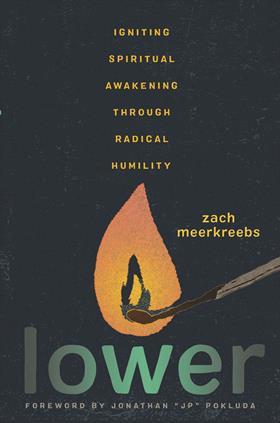
I think the beautiful thing about Jesus is he is countercultural, not only when it comes to ego, but also when it comes to sexuality, money, family systems. He had controversial, compelling, countercultural teaching on all of those.
So, when it comes to ego, I do think we’re in a unique time. God treats ego, the posture of our hearts and souls, quite seriously. Jesus speaks so highly of the virtue of humility. He exemplifies it.
Do you think the humility of the students contributed to the move of God at Asbury?
I think Jesus’ humility collided with the humility of the students. The Bible tells us that he comes close to the humble. He dignified the blind beggar on the way to Jericho, for example and the woman who had been bleeding for twelve years. All those people were at a humbled state, and Jesus uniquely met them.
If you are a Christian, the greatest moment of your life – receiving Jesus – required humility, right? That’s the micro narrative – your story, my story. What if the macro narrative was a church, city or culture having a moment of desperate humility? That excites me.
There’s a great book called Humility (Bethany House) by Andrew Murray who saw a substantial move of God in South Africa. He said: “This is the path to the higher life. Lower, lower down, just like rain falls from the sky and collects in the lowest places, so that when God finds a man empty and abase, he can flow in with his power and exalt.”
I love that picture. And it’s the reason I named my book Lower (FaithWords). When the rain falls, it puddles in the potholes and the low places. If the power and presence of God is falling, I would like to be a place where it puddles up, not a place where it runs off. So [did Asbury happen because of] prayer? Fasting? Consecration? I don’t know, but all those things do require a heart posture. And I think that heart posture is Jesus’ heart posture, which is Philippians 2 – humility.
To hear the full interview listen to Premier Christian Radio at 8pm on Saturday 7 June or download ‘The Profile’ podcast













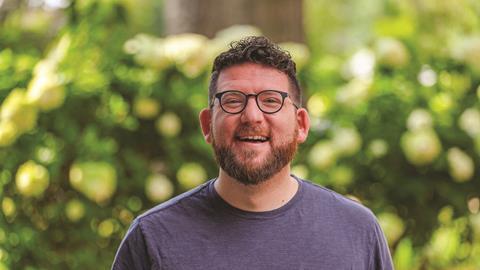

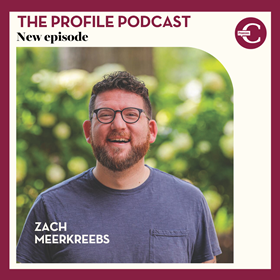
























No comments yet